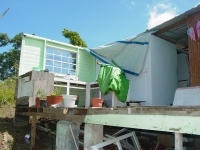
|
 United Caribbean TrustDisaster Mitigation
Community Empowerment
Disaster Action Kids Club |
y
home >> homes
of hope caribbean>>community disaster mitigation
Homes of Hope Caribbean - Community Disaster Mitigation  The
Community in which we live could be exposed to hazards which could make
us face and have to learn to cope, with emergency situations. The
Community in which we live could be exposed to hazards which could make
us face and have to learn to cope, with emergency situations.
At such times, we have to be prepared to respond to the larger needs of the community and to be organized and attend to the Information and education needs of all members of the community. This has to be done independently from the assistance received from outside the community itself so as to self-empower resident’s recovery and encourage community wellness. TIME TABLE The participation and coordinated efforts of all members of the community are necessary to the development of a feasible and workable recovery plan. To do this, we need to HAZARD: the presence of a phenomenon, natural or man-made that can threaten a group of people, their activities and their environment. Natural Hazards include: 
Hurricanes Human – Action (man-made is gender biased therefore
politically incorrect) hazards include: To do this, it is necessary to know: 1) The characteristics of the area regarding Social, Cultural,
Economic or Religious organizations and the organization’s status
( GOs, NGOs, FBOs). We can’t forget the situations we have faced in the past as the lessons learned are invaluable in teaching us to cope the crises of the future. In order to cope effectively, it is important to exchange experiences and information with the technicians from the different institutions that serve our communities. These include: Source: 'Extracts from Community Emergency Plan' CDERA |

|
| Copyright © 2022 www.UnitedCaribbean.com. All rights reserved. Disclaimer Click to Contact us |